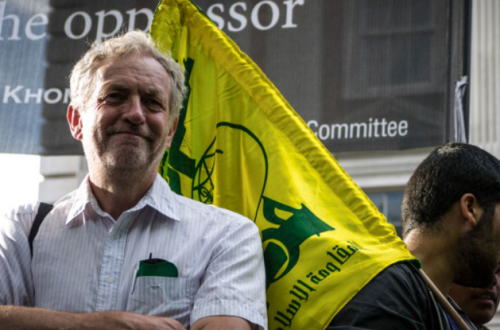According to the Guardian, which has a copy of the Government’s draft anti-extremism strategy (”Contest 2“), this is what makes you an extremist:
• They advocate a caliphate, a pan-Islamic state encompassing many countries.
• They promote Sharia law.
• They believe in jihad, or armed resistance, anywhere in the world. This would include armed resistance by Palestinians against the Israeli military.
• They argue that Islam bans homosexuality and that it is a sin against Allah.
• They fail to condemn the killing of British soldiers in Iraq or Afghanistan.
The Guardian has rather condensed and summarised these proposals: but they seem spot on, to me.
They have also impressed Ed Husain:
Ed Husain, of the Quilliam Foundation thinktank, said the root causes of terrorism were extremist views, even if those advocating the views did not call for violence.
Husain, once an extremist himself, said: “Violent extremism is produced by Islamist extremism and it’s only right to get into the root causes.”
But our old friend, Bungle, disagrees:
Inayat Bunglawala, a former spokesman for the Muslim Council of Great Britain, said such plans would affect many British Muslims. Bunglawala, who now runs Engage, which tries to get Muslims to participate in politics and civic society, said: “That would alienate the majority of the British Muslim public. It would be counterproductive and class most Muslims as extremists.”
What Bungle actually means is that (a) he holds many of these extreme Islamist views himself and (b) it would be unfair to class him as an extremist.
Bungle is wrong, of course. Soft peddling and double standards on this issue has had the effect of legitimating and emboldening Islamists, and has left ordinary people of all faiths and none feeling exposed and angry.
There’s another aspect to this story as well. Islamist groups have done rather well out of this Government’s existing “Preventing Violent Extremism” anti-terrorism strategy, as Dean Godson pointed out last year. To put it bluntly, it is absurd that public funds have gone into the pockets of the enemies of our liberal and democratic country.
There are some in the corridors of power who have been persuaded by the Cruickshank and Bergen thesis, which advocates championing the Muslim Brotherhood and other Islamist groups as a bulwark against Al Qaeda.
If the Government sticks to its guns, and if this definition is put into practice, this is extremely good news indeed.
UPDATE
Taji Mustafa of Hizb ut Tahrir has said:
“If fulfilled, these plans would be reminiscent of the approach used by the tyrannical regimes in Muslim countries who try to outlaw those aspects of Islam that would bring a just and accountable system that provides security for people there. In these countries, regimes have seen belief in these ideas grow despite the brutal methods the regimes use to prevent people adopting these Islamic ideas and such policies have merely heightened hatred and resentment of these regimes. The British government’s plans may not yet be as extreme as Stalin’s Soviet Union, where core religious ideas were labelled as against state values and banned, but they are certainly in the same direction as the policies of Senator McCarthy in the 1950’s where some political beliefs were deemed ‘un-American.’”
“‘We are seeing an attempt by the State to nationalise political and social ideas. ‘British values’ – as defined by this government, and supported by many in the Conservative party, as well as certain right wing think tanks – are in fact very specific secular liberal values. As the totalitarian streak in secular liberals emerges, there are increasing numbers of people – who hold a deep religious conviction or socially conservative views – being alienated. However, these proposals which target the Muslim community, would be a significant step further, and would indicate that only one set of political and social views are acceptable in modern Britain. It would be the ultimate fulfilment of the failed philosophy that gave birth to the war on terror where hundreds of thousands have been killed to force – without success – these same secular liberal values on the world.”
“When we read of such plans, we ask the question, who are the real extremists in today’s world?”
Er, you are Taji.
No Government money for you and your mates!
UPDATE2
Asim Siddiqui says:
But who is an extremist? To provide us with the answer, the state will do your thinking for you and will apparently provide a checklist against which you can tick off the various criteria. Anyone calling for an Islamic state, who believes in Jihad, who thinks sharia law is important or who considers homosexuality to be a sin becomes an extremist. What about just going all the way and extending it to anyone who believes God is the sovereign of the heavens and the earth, and that Islam is his chosen religion? Or maybe it would be easier to just get al-Qaida to draft the manual on “How to categorise every Muslim as an extremist”.
Actuallly, I think that if you want to create a state governed by Sharia law, or a Caliphate, and if you think that the law should be treat homosexuality as a sin, you ARE an extremist, and should be shunned by the mainstream, and should most certainly not receive a penny of state money.
There’s also this:
Rather than encourage Muslim groups and civil society to widen the space for young Muslims to discuss contentious issues and take the time they need to come up with their own answers, we have a state-sponsored proposal to essentially close down and criminalise perfectly legitimate and much needed debate. More and more young Muslims are getting politically active (not least because of events in the world) and want to do their bit to fight injustice. Civil society needs to be able to capture this dynamism and energy into the democratic framework where real change is possible. The government needs to keep out of debates on theology, it is not their role to interfere – we do not live in a theocracy – and keep their focus on those that peddle violence. They already have sufficient powers to use against preachers of violence without needing to start policing ideas and the terms of the debate too.
If Asim is right, and the Government is planning to lock up people who merely hope for an Islamic state where gays will be killed, without working towards it, I agree. This proposal would go too far.
But this is not a proposal to criminalise extremism. It is a replacement for the old, discredited, “engage and co-opt non-violent Islamists’ strategy. This is the policy which should determine which conferences Ministers attend, and which groups get grants.
There is a lot of sense in this:
The government needs to keep out of debates on theology, it is not their role to interfere – we do not live in a theocracy – and keep their focus on those that peddle violence.
The trouble is, if the Government is going to partner with faith groups, it needs criteria which enable it to do so in a manner which does not offend against the basic principles of liberal democracy.
What we have from the Guardian is a very garbled version of what those criteria will be.
They look pretty good to me.


